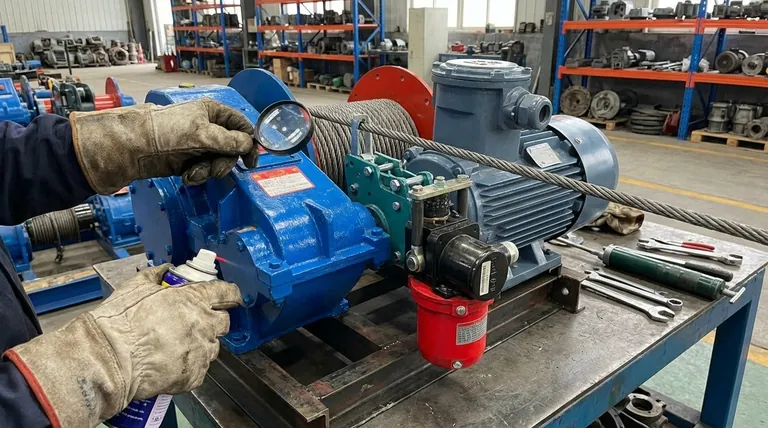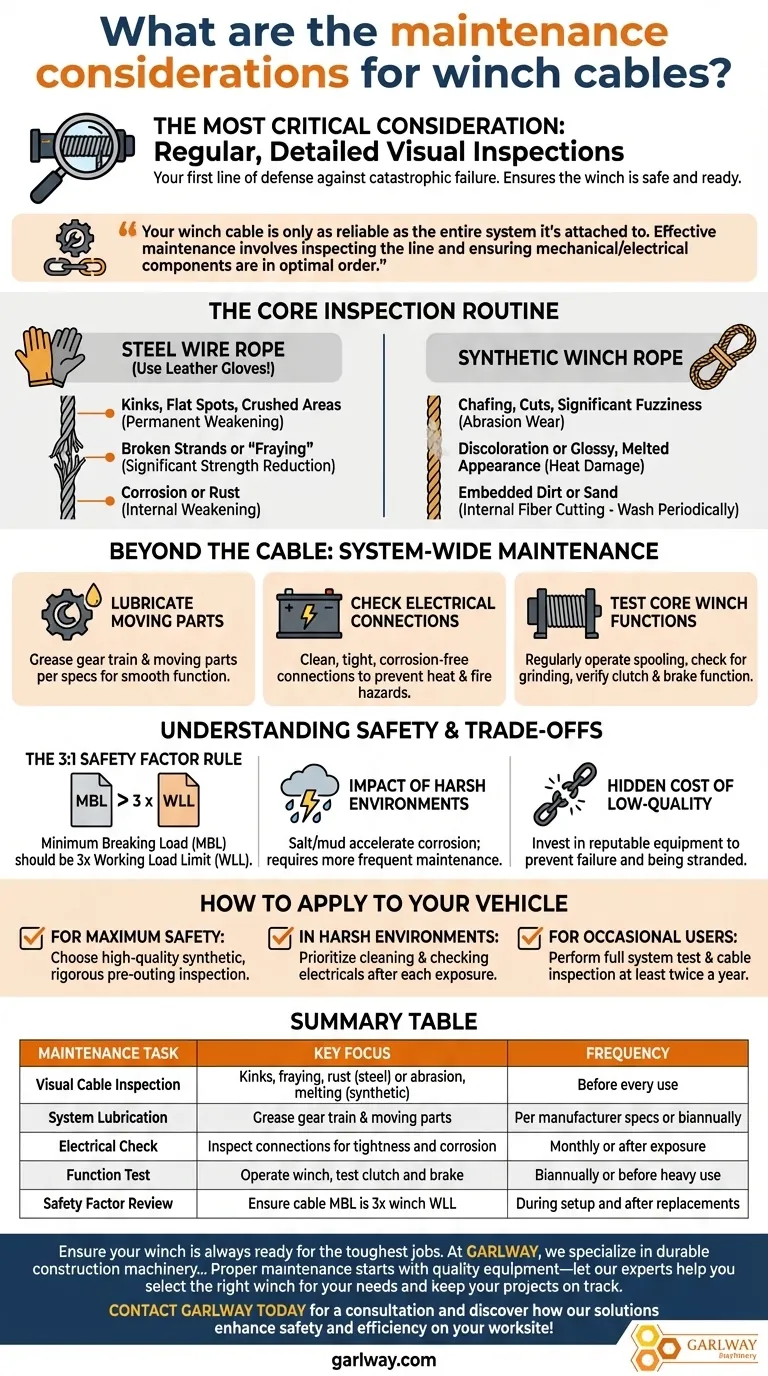The most critical maintenance consideration for a winch cable is conducting regular, detailed visual inspections for any signs of damage. This simple but essential practice is the first line of defense against a catastrophic failure, ensuring the winch is safe and ready to perform when you need it most.
Your winch cable is only as reliable as the entire system it's attached to. Effective maintenance, therefore, involves not just inspecting the line itself but also ensuring the mechanical and electrical components of the winch are in optimal working order.

The Core Inspection Routine
A winch is a system where every component's health affects the others. A worn fairlead can damage a new cable, and a weak cable can put undue stress on the motor. A regular inspection routine for the cable is the foundation of winch reliability.
Inspecting Steel Wire Rope
Steel cable is durable but prone to specific types of damage that compromise its integrity. Always wear thick leather gloves when handling steel cable to protect against sharp, broken strands known as "fish hooks."
Look for kinks, flat spots, or crushed areas, which indicate the internal structure has been permanently weakened. You must also check for broken strands or "fraying." If you find multiple broken wires in one area, the rope's breaking strength is significantly reduced. Finally, check for corrosion or rust, which can weaken the cable from the inside out.
Inspecting Synthetic Winch Rope
Synthetic rope is lighter and safer than steel but requires different maintenance. It is highly susceptible to abrasion and chemical contamination.
Check for chafing, cuts, or significant fuzziness, which indicate wear from rubbing against rough surfaces. Inspect for discoloration or a glossy, melted appearance, which can be signs of heat damage from the winch drum. Finally, feel the line for embedded dirt or sand, as these particles can cut the rope's fibers from within. Synthetic rope should be periodically washed with mild soap and water to remove this grit.
Beyond the Cable: System-Wide Maintenance
A healthy cable on a poorly maintained winch is an unreliable tool. To ensure total system integrity, your maintenance plan must include the winch unit itself.
Lubricate Moving Parts
The winch contains a gear train and other moving parts that require lubrication to function smoothly and prevent premature wear. Periodically grease these components according to the manufacturer's specifications.
Check Electrical Connections
A winch motor draws a massive electrical current. All connections, from the battery to the winch motor, must be clean, tight, and free of corrosion. A loose connection can generate extreme heat, reduce power, and create a fire hazard.
Test Core Winch Functions
Regularly operate the winch, both spooling in and out, to test the motor. Listen for any unusual grinding sounds from the gear train. You should also verify the clutch engages and disengages smoothly and that the braking system holds reliably under a light load.
Understanding the Trade-offs and Safety Factors
Proactive maintenance includes understanding the equipment's limitations and ensuring it's properly specified for the job, which prevents overloading and damage in the first place.
The 3:1 Safety Factor Rule
A fundamental principle of safe winching is maintaining a proper safety factor. Your cable's Minimum Breaking Load (MBL) should be at least three times the winch's Working Load Limit (WLL). This buffer is critical for handling the dynamic and unexpected stresses that occur during a real-world recovery.
The Impact of Harsh Environments
Winches used in "salt belt" regions or in consistently muddy or wet conditions require much more frequent maintenance. Salt and grit accelerate corrosion and wear on all components, from the cable to the electrical contacts. In these environments, maintenance frequency may be dictated by exposure, not just by usage.
The Hidden Cost of Low-Quality Equipment
While high-end models aren't always necessary for occasional use, extremely low-quality winches are prone to failure. Investing in a reputable, well-made winch, even a budget-friendly one, is a form of preventative maintenance that saves you from being stranded with a broken tool.
How to Apply This to Your Vehicle
Your specific maintenance schedule should align with your usage and environment. A systematic approach is the best way to guarantee performance and safety.
- If your primary focus is maximum safety: Choose a high-quality synthetic rope and pair it with a rigorous inspection schedule for abrasion and UV damage before every outing.
- If you operate in harsh, corrosive environments: Prioritize cleaning the winch assembly and checking all electrical connections for corrosion after each significant exposure to mud, water, or road salt.
- If you are an occasional user: Perform a full system function test (motor, brake, clutch) and cable inspection at least twice a year to prevent seizing and identify issues before you need the winch.
Ultimately, consistent and thorough maintenance transforms your winch from a potential liability into your most trusted recovery tool.
Summary Table:
| Maintenance Task | Key Focus | Frequency |
|---|---|---|
| Visual Cable Inspection | Check for kinks, broken strands, rust (steel) or abrasion, melting (synthetic) | Before every use |
| System Lubrication | Grease gear train and moving parts | Per manufacturer specs or biannually |
| Electrical Check | Inspect connections for tightness and corrosion | Monthly or after exposure |
| Function Test | Operate winch, test clutch and brake | Biannually or before heavy use |
| Safety Factor Review | Ensure cable MBL is 3x winch WLL | During setup and after replacements |
Ensure your winch is always ready for the toughest jobs. At GARLWAY, we specialize in durable construction machinery, including reliable winches, concrete mixers, and batching plants designed for contractors and construction companies worldwide. Proper maintenance starts with quality equipment—let our experts help you select the right winch for your needs and keep your projects on track. Contact GARLWAY today for a consultation and discover how our solutions enhance safety and efficiency on your worksite!
Visual Guide

Related Products
- Electric and Hydraulic Winch for Heavy Duty Applications
- Warn Winch Windlass Boat Trailer Winch
- Electric 120V Boat Winch by Badlands
- Best 18000 Pound Drum Anchor Trailer Winch
- 12000 lb Heavy Duty Electric Boat Winch
People Also Ask
- What are the advantages of using a drum winch for anchoring? Simplify Your Boating with Unmatched Reliability
- What maintenance practices are recommended for marine hydraulic winches? A Proactive Guide to Maximize Reliability
- What are the options for initiating a winch hire or purchase? Get Expert Guidance
- What are the differences between manual and electric winches? Choose the Right Tool for Your Job
- What are the rated speeds of slow-speed and high-speed winches? A Guide to Choosing for Control or Efficiency
- What is the difference between horizontal and vertical windlasses? Choose the Right Fit for Your Boat
- What is an electric winch and what are its uses? A Guide to Powerful Lifting & Pulling Solutions
- What safety precautions should be taken when using a winch? Essential Steps for Safe and Effective Operation



















